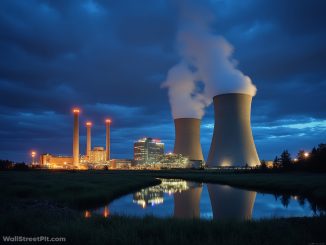
Meta Platforms Inc. (META) has embarked on an ambitious quest to secure a sustainable energy future for its burgeoning artificial intelligence (AI) operations, signaling a significant shift towards nuclear energy. According to a report by Bloomberg, the company, known for its vast data center network supporting services like Instagram and WhatsApp, is now eyeing up to 4 gigawatts of nuclear power to be delivered in the early 2030s. This move underscores the tech industry’s growing recognition of nuclear energy’s potential to provide a stable, clean energy supply amidst the voracious power demands of AI development.
Nuclear energy, with its capacity to provide consistent, carbon-free electricity, presents an attractive solution for tech giants like Meta, Amazon (AMZN), and Alphabet (GOOG, GOOGL), who are all grappling with the energy-intensive nature of AI operations. These companies are not just looking to power their data centers but are also aiming to contribute to a more sustainable energy grid in the U.S. where traditional nuclear construction has largely stagnated due to high costs and regulatory hurdles.
Meta’s approach to this challenge is notably inclusive, considering both traditional large-scale nuclear reactors and the innovative small modular reactors (SMRs). SMRs promise a quicker and potentially more cost-effective deployment, although they are still largely untested in commercial applications. This dual strategy reflects Meta’s willingness to navigate the complexities of nuclear power development, from regulatory compliance to technological innovation.
The interest in nuclear power among tech companies isn’t isolated to Meta. Alphabet has invested in advanced reactor technologies, while Amazon has made strategic moves in this space, and Microsoft has secured power from the notable Three Mile Island site. These actions collectively suggest a tech-driven revival in nuclear energy, potentially catalyzing a new era of nuclear infrastructure development in the U.S.
Adam Stein from the Breakthrough Institute told Bloomberg that the tech sector’s deep pockets and long-term investment perspective could indeed speed up nuclear projects. “They are willing to take on a little more of the early financial risk,” he noted, pointing out that this could lead to a scenario where tech companies outpace traditional utilities in nuclear energy development, filling a gap left by the latter’s cautious approach.
However, the path to implementing nuclear energy for data centers is fraught with challenges beyond just financial investment. Regulatory processes, community acceptance, and the actual construction of nuclear facilities pose significant barriers. Yet, as Stein suggests, with proactive engagement, the goal of having new nuclear capacity online by the early 2030s is within reach.
This strategic pivot by Meta, and its peers in the tech industry, could be a game-changer, not only for their operational capabilities but also for the broader push towards decarbonization in the energy sector. By leveraging nuclear power, these companies aim to meet their hefty energy demands while aligning with environmental sustainability goals, setting a precedent for how tech can lead in the energy transition.
Price Action: Meta shares are experiencing a slight decline of 0.25% in pre-market trading, currently at $612.07. Despite this modest dip, the stock’s overall performance remains impressive, with a nearly 74% increase year-to-date and a 93% surge year-over-year as of Tuesday’s close at $613.65.
- Bulenox: Get 45% to 91% OFF ... Use Discount Code: UNO
- Risk Our Money Not Yours | Get 50% to 90% OFF ... Use Discount Code: MMBVBKSM
Disclaimer: This page contains affiliate links. If you choose to make a purchase after clicking a link, we may receive a commission at no additional cost to you. Thank you for your support!





Leave a Reply